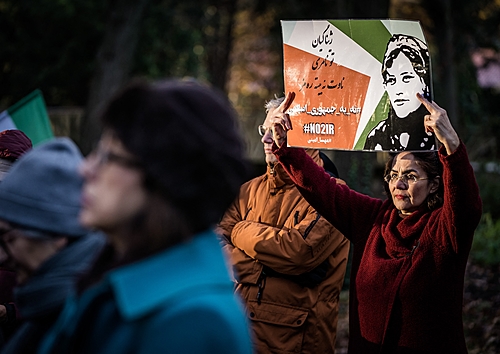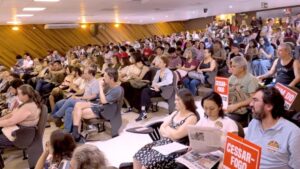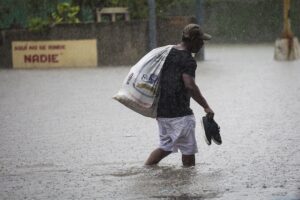
Three men were executed this Friday (19/05) in Iran, accused of involvement in the death of members of the security forces during protests that have taken place in the country since September last year, due to the death of the young girl Jina Mahsa Amini, according to information. of the Judiciary.
Majid Kazemi, Saleh Mirhashemi and Saeed Yaghoubi were convicted of “moharebeh”, or “war against God”, for pulling a gun during a demonstration in November in the city of Isfahan, reported the website of Mizan Online, linked to the judiciary.
Authorities said the men killed two members of the Basij paramilitary force and an officer. The trio were then arrested and sentenced to death in January of this year.
The men were also accused of being part of “illegal groups with the intention of destabilizing national security and conspiracy, which led to crimes against internal security”, published Mizan Online.
The website also wrote that “evidence and documents about the case and the blatant statements made by the accused” show that “the shootings carried out by the three men led to the martyrdom of three members of the security forces”.
confession under torture
Human rights groups such as Amnesty International say the three men were subjected to torture, forced to videotape confessions and were denied access to proper legal proceedings.
Kamran Matin, senior lecturer in international relations at the University of Sussex in the UK, told DW that the men’s trial was typical of the characteristics of Iran’s legal system.
“The defendants have not appointed their own lawyers. But this is standard procedure, especially when it involves political crimes… Generally, the main evidence is the confession, which is often made under suspicious circumstances or under torture,” Martin said.
The professor added that an audio file, in which one of the men says that they had confessed to the crimes due to the mistreatment suffered at the hands of the Iranian authorities, was smuggled out of the prison.
On Thursday, the US State Department urged Iran not to carry out the executions. A day earlier, in a handwritten note, the three men made a public appeal not to be executed: “Don’t let them kill us.”
Germany and US condemn executions
The German Foreign Ministry condemned the executions: “The federal government rejects the death penalty in all circumstances. We continue to call on Iran to immediately stop this inhuman, cruel and degrading form of punishment,” a spokesman told the agency. German dpa news this Friday.
The European Union (EU) made a similar statement. A spokesman urged Iranian authorities “to immediately stop the practice of imposing and carrying out death sentences against protesters, which must be strongly condemned”.
On Twitter, Berlin human rights commissioner Luise Amtsberg expressed her dismay: “Once again, the regime in Iran has taken the lives of three protesters. Once again, it has executed people who stood for freedom. I can hardly find the words for describe escalating violence and mass executions”.
Amnesty International also tweeted: “We are deeply shocked by this blatant act of revenge by the Iranian government against the bravest generation of protesters in Iran.”
Protests since September
The biggest demonstrations in decades broke out in Iran in September 2022, after the death in custody of Jina Mahsa Amini, a 22-year-old Iranian Kurd who had been arrested by Iran’s morality police accused of having “inappropriately used” the islamic veil.
Authorities said the young woman suffered a heart attack, but witnesses say she was severely beaten and died as a result of police brutality.
The protests quickly spread to calls for the overthrow of the theocracy that has ruled Iran since the 1979 Islamic Revolution.
The Iranian political system is a complex combination of Shiite clerical authority and an elected president and parliament. The president handles day-to-day government affairs, but is guided by the deeply anti-Western Ayatollah Ali Khamenei.
A watchdog body made up of clerics and jurists – aligned with the supreme leader and prone to drastic political and social restrictions – has the power to veto laws and decide who can run for political office.
Due to the wave of protests in several cities, Tehran launched a strong crackdown through security forces, labeling the demonstrations as “riots” instigated by foreigners.
Thousands of Iranians were arrested and hundreds were killed, including dozens of members of the security forces. Human rights groups claim Iran has executed nearly 600 people in 2022 alone, nearly double the 333 the year before.
This year, especially in recent weeks, more than 200 people were executed, according to information from the United Nations (UN).
The rise of the death penalty, including for vague charges such as “enmity against God” and “spreading corruption on earth”, has been widely criticised.
Demonstrations have largely subsided, although there are still sporadic acts, including the refusal of some women to wear the mandatory Islamic headscarf.
gb (AFP, Reuters, dpa)
Source: www.brasildefato.com.br

